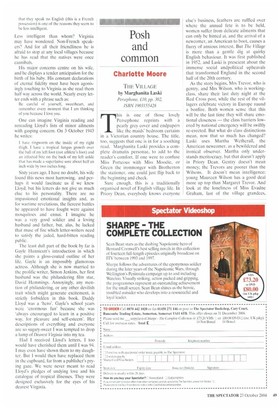Posh and common
Charlotte Moore
THE VILLAGE by Marghanita Laski Persephone, £10, pp. 302,
ISBN 1903155428
This is one of those lovely Persephone reprints with a pearly grey cover and endpapers like the maids' bedroom curtains in a Victorian country house. The title, too, suggests that one is in for a soothing read. Marghanita Laski provides a complete dramatis personae, to add to the reader's comfort. If one were to confuse Miss Porteous with Miss Moodie, or Green the ironmonger with Brotherton the stationer, one could just flip back to the beginning and check.
Sure enough, this is a traditionally organised novel of English village life. In Priory Dean, everybody knows everyone
else's business, Feathers arc ruffled over where the annual fete is to he held, women suffer from delicate ailments that can only be hinted at, and the arrival of a newcomer, an American to boot, causes a flurry of anxious interest. But The Village is more than a gentle dig at quirky English behaviour. It was first published in 1952, and Laski is prescient about the immense social andpolitical upheavals that transformed England in the second half of the 20th century.
As the story begins, Mrs Trevor, who is gentry, and Mrs Wilson, who is workingclass, share their last duty night at the Red Cross post, while the rest of the villagers celebrate victory in Europe round a bonfire. Both women sense that this will be the last time they will share emotional closeness — the class barriers lowered by national emergency will be swiftly re-erected. But what do class distinctions mean, now that so much has changed? Laski uses Martha Wetherall, the American newcomer, as a bewildered and ironical observer, Martha only understands meritocracy, but that doesn't apply in Priory Dean. Gentry doesn't mean money; the Trevors are poorer than the Wilsons. It doesn't mean intelligence; young Maureen Wilson has a good deal more up top than Margaret Trevor, And look at the loneliness of Miss Evadne Graham, last of the village grandees, dying single and childless because there was no appropriate mate to fit her social background. In Darwinian terms, the English class system is on a hiding to nothing.
Margaret Trevor (posh but poor) and Roy Wilson (common but doing well) fall in love. Quiet, domestic Margaret is so deficient in a sense of class as to be, in her parents' view, almost retarded. Decent, honourable Roy, bolstered by his fearsome left-wing sister, asserts the rights of love and common sense over convention. In the ensuing clash, the villagers are forced to question traditional assumptions, and the conclusion is an uneasy compromise.
Priory Dean is only 20 miles from London. Now the wartime stasis is over, there's nothing to prevent the onrush of new building and new industry. This threat is even more unwelcome than shifting social boundaries. The novel ends on a note of foreboding; the villagers share a sense of 'doomed certainty' that the 'men with rods' measuring the fields are up to no good. The Village is a precise, evocative but unsentimental account of a period of transition; it's an absorbing novel, and a useful piece of social history.
lommom■

























































































 Previous page
Previous page